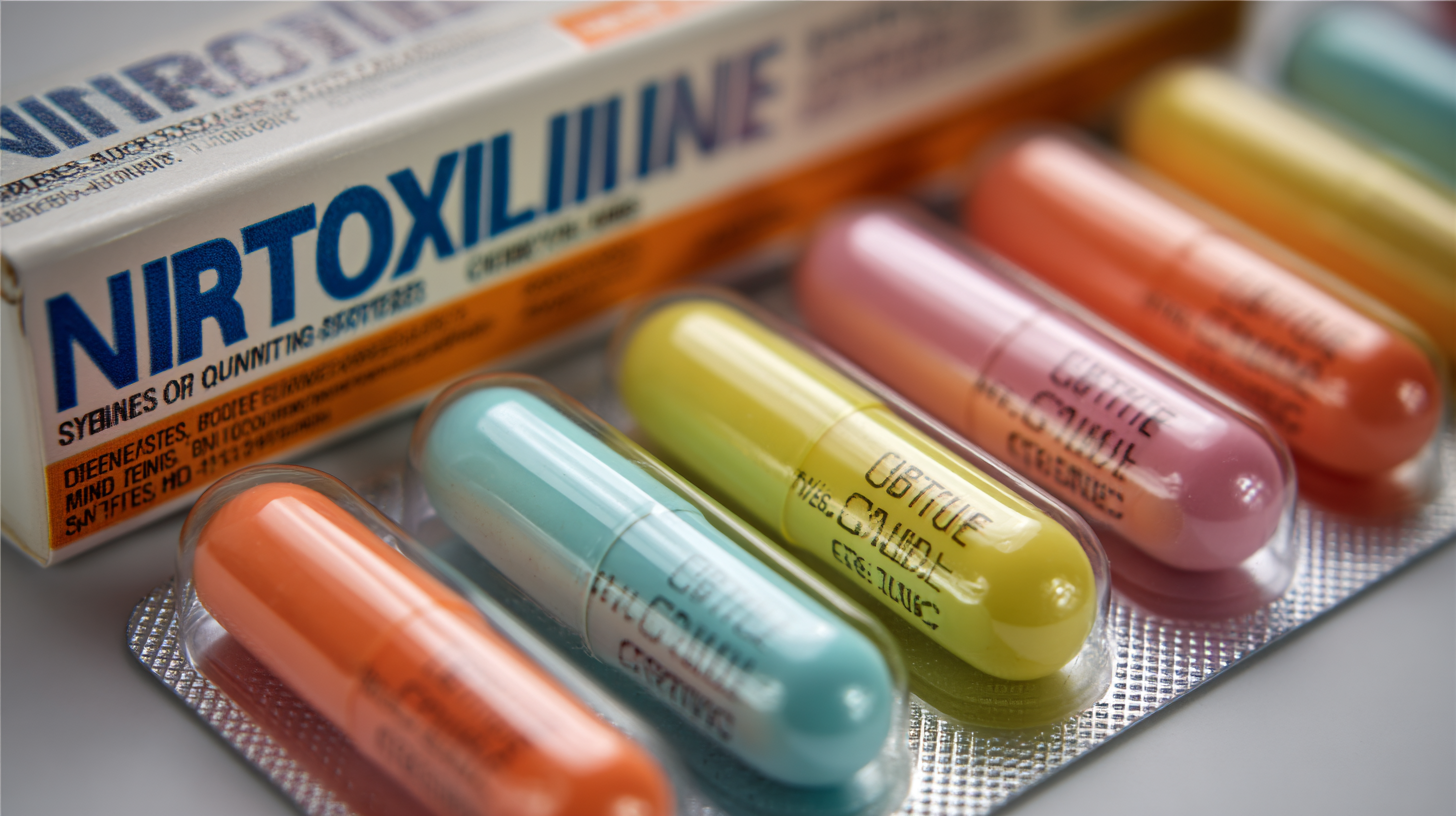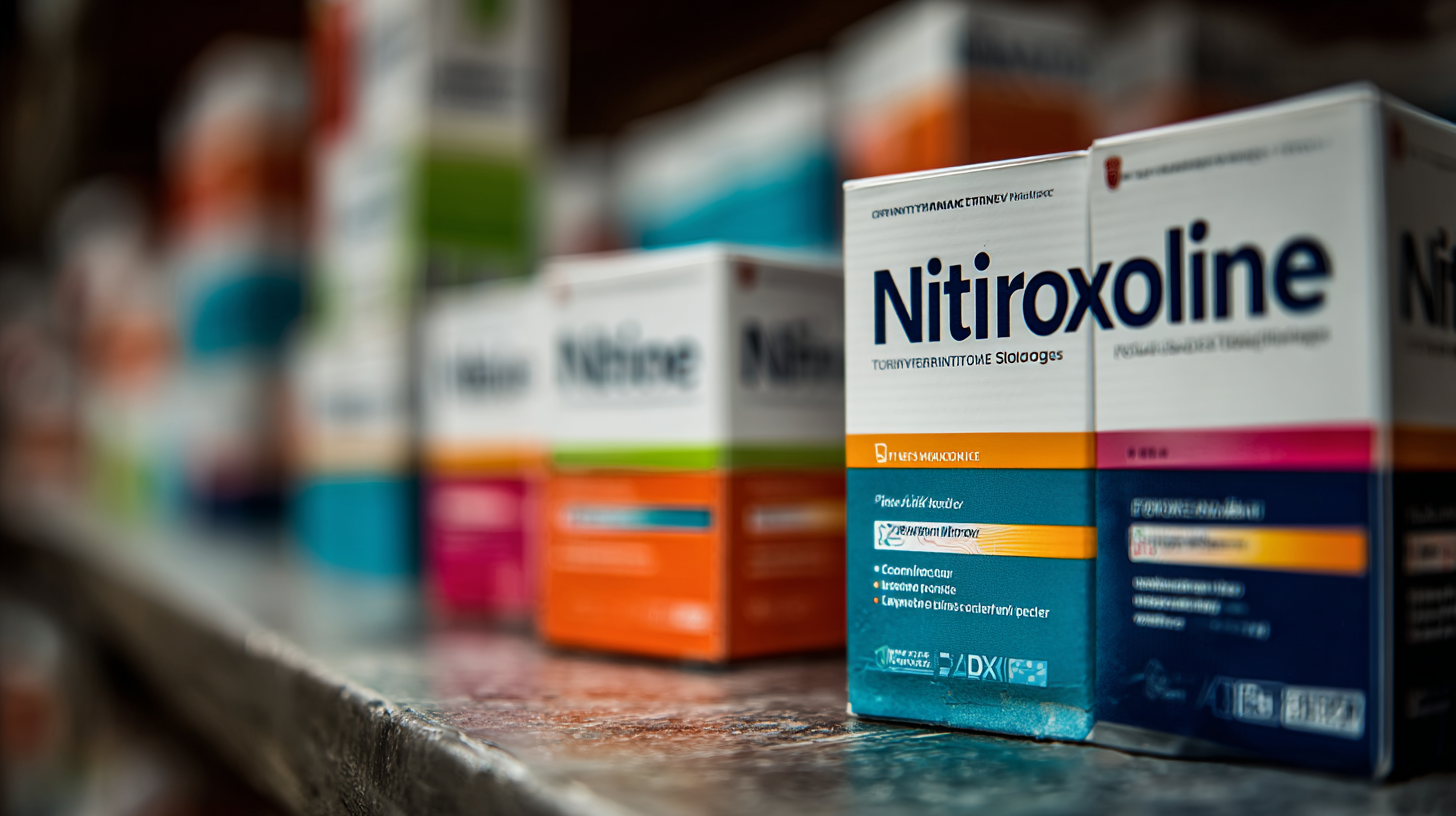Leave Your Message
 When it comes to effectively storing Nitroxoline, understanding the nuances of Nitroxoline Storage Instructions is crucial for preserving its efficacy and safety. As this medication gains traction for its use in treating urinary tract infections, the need for quality manufacturers who adhere to stringent storage protocols becomes increasingly important.
When it comes to effectively storing Nitroxoline, understanding the nuances of Nitroxoline Storage Instructions is crucial for preserving its efficacy and safety. As this medication gains traction for its use in treating urinary tract infections, the need for quality manufacturers who adhere to stringent storage protocols becomes increasingly important.
This ultimate guide aims to equip you with the knowledge needed to identify reputable manufacturers, ensuring that you receive products that not only meet the necessary regulatory standards but also follow optimal storage practices. By following these guidelines, you will be empowered to make informed decisions about sourcing Nitroxoline, thereby safeguarding your health and maximizing the benefits of this essential medication.
When it comes to the proper storage of Nitroxoline, understanding the significance of quality manufacturers cannot be overstated. Quality manufacturers not only ensure the integrity and efficacy of the product but also contribute to the safety of handling and storage processes. According to recent industry reports, products stored under optimal conditions can retain their potency for longer periods, significantly reducing wastage. Inadequate storage practices can lead to degradation, which can compromise patient safety and treatment outcomes.

Tips for identifying quality manufacturers include examining their compliance with industry standards and certifications. Look for companies that have established their credibility through adherence to Good Manufacturing Practices (GMP) and have a documented history of quality assurance. Additionally, scrutinizing the supplier's reputation within the healthcare community through customer reviews and case studies can provide valuable insights into their reliability and performance.
Another key consideration is the availability of high-quality storage solutions. Manufacturers should provide clear guidelines on the appropriate storage conditions, including temperature and humidity controls, to maintain Nitroxoline's effectiveness. Reports indicate that products stored at optimal levels can mitigate the risk of adverse reactions in patients, thus highlighting the critical role that quality manufacturers play in the pharmaceutical supply chain.
When evaluating manufacturers for the storage of nitroxoline, several key factors come into play that can significantly impact both safety and quality. First and foremost, the manufacturer's experience and reputation in handling pharmaceuticals should be scrutinized. Companies that have been in the industry for a considerable amount of time usually adhere to established safety and quality protocols. Feedback from previous clients, industry certifications, and compliance records with regional and international standards are crucial indicators of a manufacturer’s reliability.
Additionally, the facility's compliance with Good Manufacturing Practices (GMP) is another essential aspect. A GMP-compliant facility demonstrates a commitment to maintaining high-quality production standards and effective quality control measures. It is also important to assess the technology and equipment used in the production process, as advanced manufacturing technologies can enhance product stability and efficacy. By focusing on these factors, you can ensure that the manufacturer you choose will provide proper nitroxoline storage solutions that meet both regulatory requirements and your specific needs.
When sourcing quality manufacturers for nitroxoline storage instructions, it is crucial to assess their manufacturing standards and certifications. The first step is to investigate whether the manufacturer adheres to internationally recognized quality management systems, such as ISO 9001. This certification indicates a commitment to quality and consistency in the manufacturing process, ensuring that the products meet specific safety and efficacy standards. Additionally, look for certifications related to pharmaceutical manufacturing, such as Good Manufacturing Practices (GMP), which further assures that the products are produced in a controlled and compliant environment.
Furthermore, assess the manufacturer’s compliance with regulatory requirements specific to your region, such as FDA approval in the United States or EMA guidelines in Europe. Manufacturers that have a proven track record of compliance with these regulations are more likely to provide high-quality nitroxoline products. Requesting audits or quality assurance reports can also provide valuable insights into their processes. By focusing on these standards and certifications, you can ensure that you are partnering with a manufacturer that prioritizes quality and safety in nitroxoline storage instructions.
| Criteria | Description | Importance | Example Certifications |
|---|---|---|---|
| Quality Management System | A formalized system that documents processes and procedures for quality benchmarks. | High | ISO 9001 |
| Good Manufacturing Practices | Regulatory guidelines ensuring products are consistently produced and controlled. | Critical | GMP Certification |
| Stability Testing | Assessment of a product's ability to maintain its intended physical, chemical, and microbiological quality. | Essential | ICH Guidelines |
| Certifications for Environmental Compliance | Assessing adherence to environmental standards in manufacturing processes. | High | ISO 14001 |
| Traceability and Documentation | Ability to track product history and quality control processes. | Very High | Industry Standards |
| Employee Training Programs | Ongoing education for staff on quality standards and procedures. | High | Internal Certifications |
When seeking quality manufacturers for Nitroxoline storage solutions, effective communication of your requirements is crucial. According to a report by Global Market Insights, clear specifications can enhance supplier relationships and streamline production processes, ultimately leading to higher-quality outcomes. To ensure that your expectations are met, consider the following tips.
First, outline your exact needs in terms of material specifications, packaging requirements, and safety standards. Use precise language, avoiding jargon that may confuse manufacturers. For instance, if your Nitroxoline requires specific temperature control during storage, explicitly state the temperature range and duration. Detailed guidelines improve the likelihood of satisfactory results.
Additionally, establish a feedback loop during the manufacturing process. Regular check-ins can help address any misunderstandings early, reducing costly mistakes. A study from the Institute of Supply Chain Management emphasizes that organizations with strong communication practices see a 25% improvement in supplier performance. Always encourage manufacturers to ask questions or seek clarifications, fostering an environment of collaboration and mutual understanding.

When it comes to ensuring the quality of Nitroxoline storage, ongoing quality assurance and monitoring are paramount. According to a study by the International Pharmaceutical Federation, consistent adherence to quality standards can reduce product defects by up to 30%. Regular audits and evaluations not only detect potential issues early but also reinforce best practices among manufacturers. Implementing a rigorous quality management system that aligns with ISO 9001 standards can significantly enhance product reliability.
Tips for maintaining effective quality assurance include establishing clear protocols for storage temperature and humidity, as deviations can lead to degradation of Nitroxoline. Additionally, it is essential to conduct routine checks and validations of storage conditions. Recent data from the Global Pharmaceutical Storage Report indicates that facilities with regular monitoring systems have a 40% lower incidence of product spoilage.
Another best practice involves training staff on quality protocols. Ensuring that team members understand the importance of storage conditions and quality checks can lead to a more vigilant work environment. Initiatives by organizations such as the FDA emphasize the need for comprehensive staff training, contributing to a decrease in error rates in quality handling procedures.
